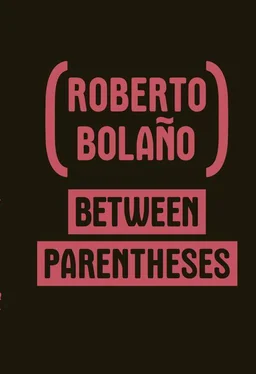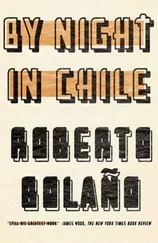Roberto Bolaño - Between Parentheses - Essays, Articles and Speeches, 1998-2003
Здесь есть возможность читать онлайн «Roberto Bolaño - Between Parentheses - Essays, Articles and Speeches, 1998-2003» весь текст электронной книги совершенно бесплатно (целиком полную версию без сокращений). В некоторых случаях можно слушать аудио, скачать через торрент в формате fb2 и присутствует краткое содержание. Год выпуска: 2011, Издательство: New Directions, Жанр: Публицистика, Критика, на английском языке. Описание произведения, (предисловие) а так же отзывы посетителей доступны на портале библиотеки ЛибКат.
- Название:Between Parentheses: Essays, Articles and Speeches, 1998-2003
- Автор:
- Издательство:New Directions
- Жанр:
- Год:2011
- ISBN:нет данных
- Рейтинг книги:4 / 5. Голосов: 1
-
Избранное:Добавить в избранное
- Отзывы:
-
Ваша оценка:
- 80
- 1
- 2
- 3
- 4
- 5
Between Parentheses: Essays, Articles and Speeches, 1998-2003: краткое содержание, описание и аннотация
Предлагаем к чтению аннотацию, описание, краткое содержание или предисловие (зависит от того, что написал сам автор книги «Between Parentheses: Essays, Articles and Speeches, 1998-2003»). Если вы не нашли необходимую информацию о книге — напишите в комментариях, мы постараемся отыскать её.
The Savage Detectives
Between Parenthese
Between Parentheses: Essays, Articles and Speeches, 1998-2003 — читать онлайн бесплатно полную книгу (весь текст) целиком
Ниже представлен текст книги, разбитый по страницам. Система сохранения места последней прочитанной страницы, позволяет с удобством читать онлайн бесплатно книгу «Between Parentheses: Essays, Articles and Speeches, 1998-2003», без необходимости каждый раз заново искать на чём Вы остановились. Поставьте закладку, и сможете в любой момент перейти на страницу, на которой закончили чтение.
Интервал:
Закладка:
THE TRIP
So I went back to Chile. I got on a plane. I don’t know how planes manage to stay up in the air. Turbulence over the Atlantic, turbulence over the Amazon. Turbulence over Argentina and just before crossing the Andes. On top of it all, Lautaro, my eight-year-old son, couldn’t play his Game Boy during the flight. But it’s okay. We’re flying. My son is sleeping peacefully. My wife, Carolina López, is sleeping peacefully. The two of them are Spanish and it’s their first trip to America. I’m not asleep. I was born in America. I’m Chilean. I’m awake and I’m holding up the wings of the plane mentally. I listen to the other passengers talk. Most of them are asleep but they’re talking in their sleep. They have nightmares or recurring dreams. They’re Chilean. The Spanish stewardesses glance at them as they walk back and forth down the aisles, sometimes parallel to each other and sometimes in opposite directions. When it’s the latter and their paths intersect, the stewardesses raise their eyebrows in the dark and continue on unperturbed. Wonderful, the women of Spain. Would you like a glass of water, orange juice? they ask when they pass me. No, thanks very much, I say. No, many thanks, I say, as the jet engines drill through the night, the night itself a plane flying inside another plane. The ancients depicted this as a fish eating a fish eating another fish. Meanwhile, the real night, outside the plane, is huge and the moon is very small, like Pezoa Véliz’s moon. I’m on my way to Chile. Every once in a while I drop off to sleep, too, and I have strange and vivid dreams. Brief dreams in black and white that take me back to lives I’ll never live. If people slept during the day they’d dream in color, my son said to me once. Fuck, I’m approaching Chile at more than five hundred miles an hour. And finally dawn begins to break and the plane crosses the Andes and now we’re back and here’s the first change: the last time I left Chile, on a Santiago-Buenos Aires flight, the Andes seemed much bigger and whiter; now they don’t seem so big and the snow is striking for its absence. But they’re still pretty. They seem wilder, more lost, less sleepy. Then the plane is over a dusty stretch of ground, and with no time even to think “Pure, Chile, are your blue skies,” it lands.
A HOOKER RETURNS
I’m back home. No problem. The passengers get up out of their seats: I don’t see any especially happy faces. Instead everyone seems worried, except for the woman sitting directly behind me. During the night I heard her talking. From what she says I deduce that she’s a hooker. A Chilean hooker who works in Europe and is returning to Chile after a more or less extended absence to buy real estate, although it’s not clear to me where: sometimes she seems to say the south and other times she talks about abandoned buildings in Santiago. In any case, she’s a woman with a nice face and dyed blonde hair, her body still lovely, and — surprise — she talks in her sleep too. Unintelligible words in Spanish and Italian and German. For a few minutes, I heard her snoring almost as loudly as the engines of the plane that had miraculously brought us to Chile. When I heard her, I thought those exaggerated snores might be a bad omen. I thought about saying something. But in the end I decided not to do anything and the snoring stopped all of a sudden, as if it were simply the physical manifestation of a nightmare she’d had, this hooker with a heart of gold, and then moved beyond, just as one leaves behind bad days and illnesses.
A while ago I met a Chilean who was always having a hard time. No matter where he was or what he was doing, he was having a hard time. This Chilean, a drifter, sometimes reminisced about his native country and he always ended his ramblings in the same way: I’m going to kiss the ground, he’d say. When I get back to Chile the first thing I’ll do is kiss the ground. He had forgotten the terror, the injustice, the folly. Baffled and amused, we made fun of him, but he didn’t care. Go ahead and laugh, he’d say, but the first thing I’ll do when I get back is kiss Chilean soil. I think he died in some South or Central American country, and if he had returned, I imagine his face would look just like the faces of the other Chilean passengers (except the hooker), deadly serious, worried, as if seen from several angles at once, mutating in seconds from Cézanne to Picasso to Basquiat, the usual face of the natives of this long and narrow country, this island-corridor. Of course, I didn’t kiss my native soil. I tried not to trip on the way out of the plane and I tried to light one of my last Spanish cigarettes with a steady hand. Then I breathed the air of Santiago and we headed toward Customs.
THE FACES
And all of a sudden, there were the Chilean faces, the faces of my childhood and adolescence, everywhere, streaming, I was surrounded by Chileans, Chileans who looked like Chileans, Chileans who looked like Martians, Chileans walking around with nothing to do in an airport that I guess wasn’t the old Pudahuel Airport though at moments it seemed like it, and also Chileans waiting for passengers and waving white handkerchiefs, and even Chileans crying (a common sight, as I remembered, Chileans cry a lot, sometimes for no reason, sometimes even when they don’t feel like crying), and also Chileans laughing as if the world were about to end and they were the only ones who knew it. But most of all what I saw in those first few moments were Chileans standing still and silent, Chileans staring at the floor as if they were floating over an uncertain abyss, as if the airport were a specter and all of us were suspended over a kind of nothing that miraculously (or inevitably) kept us aloft and that demanded in return a mysterious and unspeakable tribute, a tribute that no one was prepared to pay, but that no one was prepared to say they wouldn’t pay, either.
THE DANCE BEGINS
Getting through Customs was simple. It’s been years since they let me into a country so easily. My wife had to fill out a form and I think she had to pay something. When I asked what forms I had to fill out, a round, friendly little customs agent told me I didn’t have to fill out anything. That was the first welcome. The second came from a second customs agent, who decided not to search any of our suitcases. You’re all right, she said, go ahead. The third came from my grandmother and Alexandra Edwards and Totó Romero and Carlos Orellana and La Malala Ansieta, who greeted us as if we were lifelong friends. By now we were outside the airport and we were waiting for a taxi to take us to the hotel and everything was going fine, but somehow I wasn’t back in Chile yet. Or to put it another way, I was there, surrounded by Chileans, which was something I hadn’t experienced since January 1974, but I still wasn’t back, in the real sense of the word. I was still on the plane, I was still sprinting down the corridors of the airport in Madrid, I was still in bed in my house on Calle del Loro, in Blanes, I was still dreaming that I was about to go somewhere.
YOU CAN'T GO HOME AGAIN
It was Samuel Valenzuela, of Las Últimas Noticias , who really let me know that I was back. We talked for a while. I didn’t have much to say. So what I did was ask questions and Samuel Valenzuela answered them all. Samuel Valenzuela looks like someone out of a Manuel Rojas novel. I think he paints in his spare time. It was the first day, I was still jet-lagged, and we were at a ranch that they’d brought me to, an agrarian nightmare as painted by Miquel Barceló. Vicente Huidobro used to spend his vacations here, someone said behind me. This ranch — where one hundred and twenty patriots or maybe two hundred and twenty, or maybe just twenty or maybe even only two took refuge during the War of Independence, and which is now a vineyard, museum, and restaurant — is the dadaist setting of my first event on native soil. I look around and the ghosts of those patriots appear and disappear, fading into the whitewashed walls and the huge, sad trees of the great park that surrounds the ranch, in one corner of which there’s a Roman bath built by a previous owner that gave me the shivers when it was pointed out to me. The tweeness of Chileans has no equal on the planet. Neither does Chilean hospitality, and in my case it’s unceasing. Until Samuel Valenzuela takes me aside for an interview. We talk about Chilean wine. Wine that I can no longer drink. We also talk about empanadas. What does it feel like to be back? he asks. I tell him I don’t know. Nothing, I say, it doesn’t feel like anything. The next day our interview is in the paper. The headline reads: “Bolaño Can’t Go Home Again.” When I read it, I think: it’s true! With that headline, Samuel Valenzuela told me everything that he could humanly, metaphysically, ontologically, or tellurically tell me. That was when I knew I was back in Chile.
Читать дальшеИнтервал:
Закладка:
Похожие книги на «Between Parentheses: Essays, Articles and Speeches, 1998-2003»
Представляем Вашему вниманию похожие книги на «Between Parentheses: Essays, Articles and Speeches, 1998-2003» списком для выбора. Мы отобрали схожую по названию и смыслу литературу в надежде предоставить читателям больше вариантов отыскать новые, интересные, ещё непрочитанные произведения.
Обсуждение, отзывы о книге «Between Parentheses: Essays, Articles and Speeches, 1998-2003» и просто собственные мнения читателей. Оставьте ваши комментарии, напишите, что Вы думаете о произведении, его смысле или главных героях. Укажите что конкретно понравилось, а что нет, и почему Вы так считаете.












